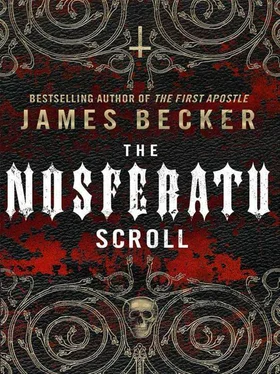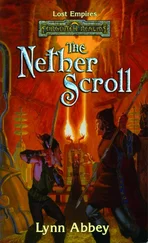James Becker - The Nosferatu Scroll
Здесь есть возможность читать онлайн «James Becker - The Nosferatu Scroll» весь текст электронной книги совершенно бесплатно (целиком полную версию без сокращений). В некоторых случаях можно слушать аудио, скачать через торрент в формате fb2 и присутствует краткое содержание. Жанр: Триллер, на английском языке. Описание произведения, (предисловие) а так же отзывы посетителей доступны на портале библиотеки ЛибКат.
- Название:The Nosferatu Scroll
- Автор:
- Жанр:
- Год:неизвестен
- ISBN:нет данных
- Рейтинг книги:4 / 5. Голосов: 1
-
Избранное:Добавить в избранное
- Отзывы:
-
Ваша оценка:
- 80
- 1
- 2
- 3
- 4
- 5
The Nosferatu Scroll: краткое содержание, описание и аннотация
Предлагаем к чтению аннотацию, описание, краткое содержание или предисловие (зависит от того, что написал сам автор книги «The Nosferatu Scroll»). Если вы не нашли необходимую информацию о книге — напишите в комментариях, мы постараемся отыскать её.
The Nosferatu Scroll — читать онлайн бесплатно полную книгу (весь текст) целиком
Ниже представлен текст книги, разбитый по страницам. Система сохранения места последней прочитанной страницы, позволяет с удобством читать онлайн бесплатно книгу «The Nosferatu Scroll», без необходимости каждый раз заново искать на чём Вы остановились. Поставьте закладку, и сможете в любой момент перейти на страницу, на которой закончили чтение.
Интервал:
Закладка:
A veglia funebre was a wake, or a vigil for the dead. Angela had guessed at the possible meaning of funebre because it looked so similar to the English ‘funeral’, or at least it probably had the same root.
Something else puzzled her about the way the sentence had been constructed. From what she knew of Italians, she doubted that any vigil for the dead could be described as ‘little’, and the repetition of the same phrase, the three Latin words which translated as ‘little’ — parvus minor minimus — so close together in the same sentence seemed to provide an unusual degree of emphasis, as if the writer was trying to convey some additional information.
Then there was the ‘little man’. Angela didn’t know a huge amount about Italian, and especially Venetian, history, but she did know that Napoleon had conquered Venice in the last decade of the eighteenth century, ending eleven hundred years of independence. His troops had sacked and virtually bankrupted the city; they had seized many of its most valuable treasures, shipping them off to Paris, where many remain to this day. He’d even stolen the Triumphal Quadriga — or Horses of St Mark — the famous bronze statues which for some time had graced the top of a triumphal arch in the French capital before the Venetians managed to have them returned.
When anybody spoke about Napoleon, the expressions ‘petty tyrant’ and ‘little man’ were often used as pejorative terms, though in reality the Emperor was of about average height for the time. The Venetians loathed him, for perfectly obvious and understandable reasons, and the expression Carmelita had used — where a little man once strutted and postured — could well refer to somewhere in Venice where Napoleon had spent some time — a district in the city, perhaps, or one of the islands. She couldn’t think of any other historical figure who was likely to have been referred to as the ‘little man’.
Then she had another thought, picked up the Italian-English dictionary again, and turned the pages until she reached the English word ‘little’. The Italian equivalent was po, poco, pochi and other forms, depending on the noun being qualified, with poco probably the commonest. Angela wrote down all the variants at the bottom of the page she was working on, and added the two Italian words — veglia funebre — as well. Maybe there was a district of Venice called Poca Veglia or something similar.
There was a tourist map of the Venetian lagoon in the pile of books in front of her. She unfolded it and checked the names of the six districts, or sestieri , of the city, but none was even slightly similar to what she was looking for. Then she expanded her search to the islands of the lagoon, moving outwards from Venice itself. Even then, she nearly missed it, because she was expecting to see something like ‘Isola di Poca Veglia’, and she was already checking the names in the southern end of the lagoon, near Chioggia, when her subconscious mind raised a flag. Her glance snapped back to the area between Venice and the Lido and there, due south of Venice itself, well away from any other islands and fairly close to the Lido, she saw it: Poveglia.
In fact, it wasn’t an island: it was three islands, shaped like an inverted triangle, with the point to the south. There was a small, regularly shaped, possibly even octagonal, island to the south, with two much larger landmasses, separated by a narrow canal that cut the island in two, directly to the north of it.
Angela looked back at the text she’d translated, and then again at the map of the Laguna Veneta . That had to be it. ‘Po’ and ‘veglia’ combined in a single word. That must be the place that Carmelita was referring to in her very simple and basic textual code.
But what about Napoleon? Was there any connection between the Emperor and the small island in the lagoon? One of the books stacked on the desk in front of her was an English-language guide to the history of Venice. She pulled it out of the pile, checked the index and then opened it to a section about midway through.
‘Yes,’ she breathed as she read the entry. During the Napoleonic Wars, the Emperor had used Poveglia as a storehouse for weapons, and there had been several vicious battles fought on and around the island. Napoleon definitely had a connection to the place, and might well have ‘strutted and postured’ there.
Angela was sure she’d identified the right island. But there had to be more to it than that. Just stating that the long-lost document was secreted on Poveglia was not enough: for a search to succeed, much more information was needed. Although the island looked reasonably small, she guessed it would still take a large team of people several days to search it.
She continued with her translation. The next line contained the word specula , which Angela had to look up. The dictionary suggested a number of translations, but a ‘tower’ or ‘watchtower’ seemed the most likely, and the Latin word campana or ‘bell’ seemed to confirm it. On the map of the lagoon it looked as if there was a tower of some sort at the southern end of the largest of the three islands.
She felt her excitement growing as she realized she might be close to identifying the exact place where the ancient document was hidden, but then her thoughts tumbled back down to earth with a bump when the further realization struck her. Marco would only keep her alive as long as she was useful to him, and the moment she had identified the hiding place and the old documents had been recovered, she didn’t think he would have any further use for her.
Could she delay completing the translation? Or would Marco guess what she was trying to do and impose a brutal punishment in retribution? Angela shuddered as she remembered the jar and its collection of hideous relics, and bent forward again over the pages.
She heard a soft footfall on the wooden floor behind her and glanced round to see Marco looking over her shoulder at the work she was doing.
‘You’ve found something,’ he said, more a statement than a question.
Angela nodded. ‘I think so, yes.’
‘Show me.’
She pointed to the last sentence she’d translated. ‘The author of this section of the text employed a fairly simple word code, but it looks to me as if she was referring to an island called Poveglia. Have you heard of it?’
Marco nodded, almost sadly. ‘Every Venetian knows about Poveglia,’ he said quietly.
42
When the guard arrived with her midday meal, Marietta stared at him listlessly. She absolutely believed what he’d said to her that morning, and she’d resigned herself to the fact that she was going to die, painfully and unpleasantly, in that damp cellar within a matter of hours. There was no point in even attempting to establish a rapport with the man, of asking for mercy or anything else. His callous attitude towards her, and towards Benedetta, had become obvious. As far as the guard and the other men were concerned, Marietta and all of the other nameless victims of the bizarre cult were simply animals who would be slaughtered when their time came.
The guard followed his usual routine and placed the tray on the floor close to the wooden bed, then picked up the other tray he’d brought down that morning. Despite the terror that bubbled inside her, Marietta had eventually eaten all the food he’d supplied, just as she expected she would finally eat whatever meal she had now been provided with.
‘This is your last meal,’ the guard said, glancing at her, ‘so you might as well make the most of it. I’ll bring warm water and a towel for you to wash yourself later this afternoon, ready for the ceremony tonight.’
Читать дальшеИнтервал:
Закладка:
Похожие книги на «The Nosferatu Scroll»
Представляем Вашему вниманию похожие книги на «The Nosferatu Scroll» списком для выбора. Мы отобрали схожую по названию и смыслу литературу в надежде предоставить читателям больше вариантов отыскать новые, интересные, ещё непрочитанные произведения.
Обсуждение, отзывы о книге «The Nosferatu Scroll» и просто собственные мнения читателей. Оставьте ваши комментарии, напишите, что Вы думаете о произведении, его смысле или главных героях. Укажите что конкретно понравилось, а что нет, и почему Вы так считаете.












